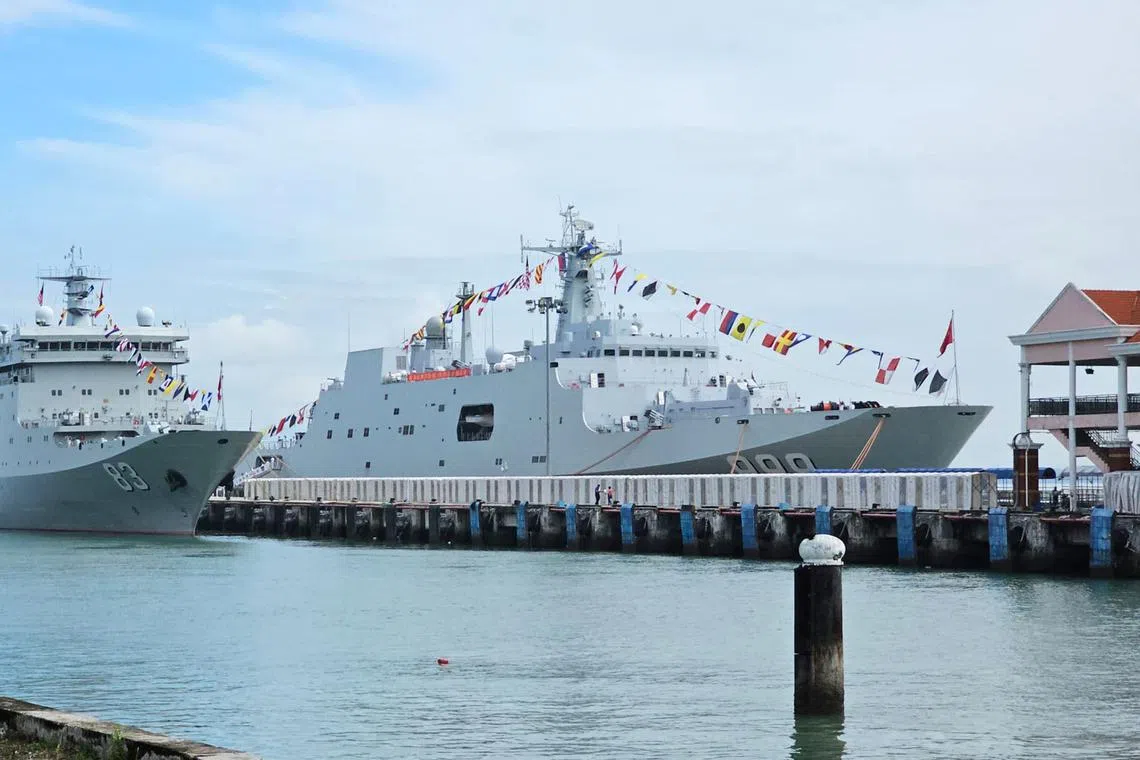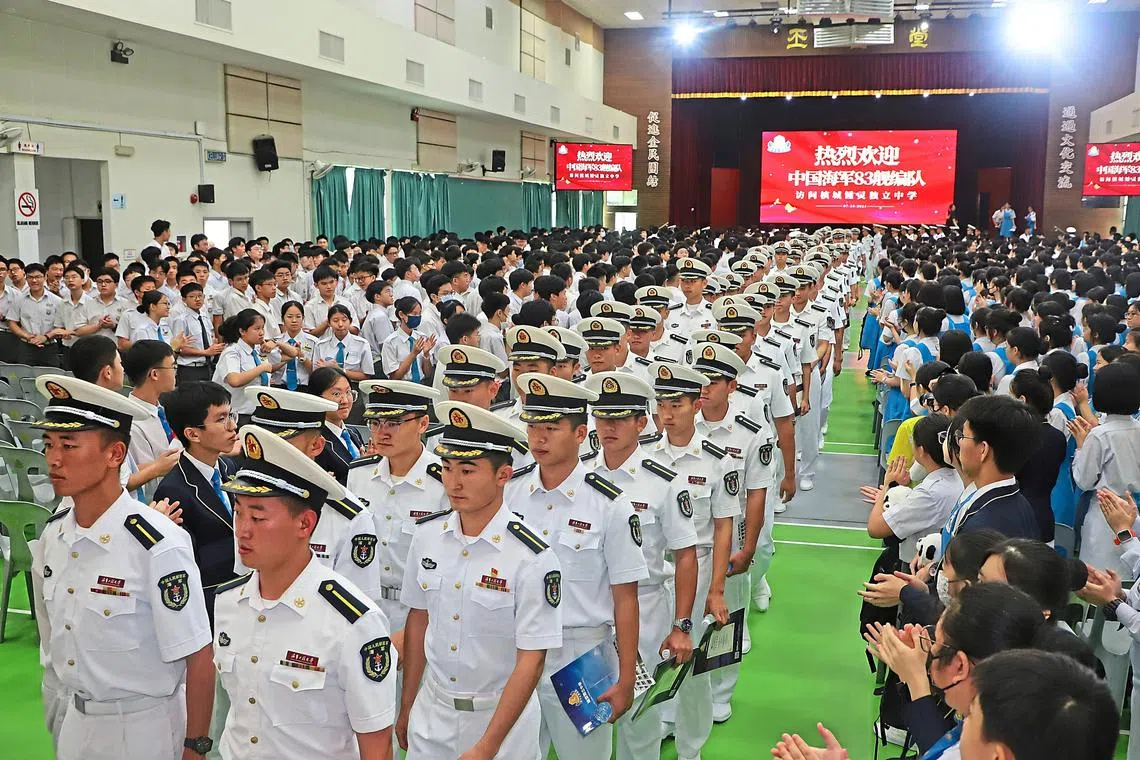Malaysia opposition MPs’ hackles raised over Chinese Navy’s port call in Penang
Sign up now: Get insights on the biggest stories in Malaysia

The two vessels that visited Penang were the training ship Qi Jiguang and the amphibious dock landing ship JinggangShan.
PHOTO: THE STAR/ASIA NEWS NETWORK
SINGAPORE - A stopover by two Chinese Navy vessels in Penang has sparked an uproar from members of Malaysia’s opposition, amid ongoing bilateral tensions with Beijing in the South China Sea over contested maritime claims.
The opposition questioned whether proper protocols from the defence and foreign ministries regarding visits by foreign navies had been cast aside, and if Malaysia’s sovereignty had been compromised by accommodating the sailors from China.
Malaysia and China have competing claims over the waters near Sabah and Sarawak.
“Was the foreign ministry consulted beforehand? Was this a decision by the defence ministry?” asked opposition Member of Parliament Saifuddin Abdullah, a former foreign minister, in a statement on Oct 10. “Why were they given such a warm and festive reception?”
Also weighing in was opposition MP Muhammad Fawwaz Mohamad Jan, who said on Oct 9: “Don’t let our nation’s sovereignty become so easily intruded and ignored by parties who are irresponsible.”
Two Malaysian Cabinet ministers responded that the government was aware of the goodwill visit.
Government spokesman Fahmi Fadzil, in response to questions from the media, told reporters on Oct 10 that such visits are undertaken with the knowledge of the Ministry of Foreign Affairs and the Ministry of Defence.
“During the ships’ docking period, the embassy or foreign representatives of the respective countries usually communicate to conduct certain activities to strengthen the ties between the two nations,” he told reporters after the monthly assembly of the Ministry of Communications on Putrajaya.
Two People’s Liberation Army (PLA) Navy ships docked in Penang on Oct 5 for a three-day visit, with local media reporting that the vessels were headed by Rear Admiral Zhai Baoran and Rear Admiral Sun Zhongyi, commanders of the PLA’s Navy Task Group 83.
China is Malaysia’s largest trading partner.
Some analysts suggested that the issue may have been raised by the Malay-led opposition to put Malaysia’s ethnic Chinese minority on the defensive.
Penang is the only Malaysian state which is controlled by the Chinese-led Democratic Action Party, and whose chief minister is ethnic Chinese.
Datuk Seri Saifuddin in his statement said: “The government needs to be more sensitive and mindful of public sentiment, especially since the media frequently reports on the intrusion of Chinese assets into our waters near Sabah and Sarawak, including protests received by Petronas regarding its activities in Kasawari (gas field).”
In late August, Philippine media outlet The Inquirer reported a leaked diplomatic note from China’s foreign ministry to the Malaysian embassy in Beijing
In response, Malaysia’s foreign ministry said on Sept 4 it would continue to defend its sovereignty and sovereign rights in the South China Sea,
China claims almost the entire South China Sea, including parts of the 200 nautical mile exclusive economic zones of the Philippines, Brunei, Malaysia, Taiwan and Vietnam, which has complicated energy exploration efforts.
Mr Fahmi, the government spokesman who is also communications minister, said, as quoted by Bernama news agency, that Malaysia also receives maritime visits from countries such as Australia, the United States and India. “We have good diplomatic relations with many countries, and all these countries dock their warships at Malaysian ports according to protocol,” he said.
The Straits Times has contacted Malaysia’s Ministry of Foreign Affairs and the Defence Ministry for comment.
The two vessels that visited Penang were the training ship Qi Jiguang and the amphibious dock landing ship Jinggangshan, with some 1,000 personnel on board, The Star newspaper reported on Oct 8.
Some of the uniformed visitors dropped by the Chung Ling Private High School in George Town, where they sang and played friendly games of table tennis and basketball with the students.
Pictures of the two PLA Navy vessels in Penang port, and of Malaysian students clapping as a row of uniformed young men marched past in the school’s main hall, were widely circulated on social media.

Some of the uniformed visitors dropped by the Chung Ling Private High School in George Town.
PHOTO: THE STAR/ASIA NEWS NETWORK
Education Minister Fadhlina Sidek dismissed claims that the visit to the school involved Chinese naval officers.
She said the delegation that visited the school comprised 165 students and lecturers from a Chinese university who were part of a cultural exchange programme.
Dr Lam Choong Wah, deputy head of the Department of International and Strategic Studies, University of Malaya, said Malaysia maintains a “low-profile” attitude in the South China Sea dispute, and wants to resolve it through diplomatic means.
“That does not mean we betray our national interests,” he said.
Dr Oh Ei Sun, senior fellow at Singapore Institute of International Affairs, sees the opposition complaints as an attempt to stir up race issues to rouse voters against Penang’s governing coalition.
The opposition Perikatan Nasional (PN) coalition holds 11 of the 40 seats in the Penang state legislature.
“With the more racially motivated PN now occupying more than a quarter of the state assembly seats, there is now a concerted effort to seize on race-related issues, such as this insinuating of some form of liaison between China and the local Chinese,” he said.


